Liberation Day!
"The Celebration of the Resistance" marks its 80th anniversary
Today is Liberation Day (Festa della Liberazione), a national holiday in Italy. It commemorates the victory of the Italian resistance movement against Nazi Germany and the Italian Social Republic, which was a puppet state of the Germans led by the Italian dictator Benito Mussolini.
Milan, the city I now call home, was liberated from the Nazis 80 years ago today.
Having lived here just 30 months, I’m still relatively new to Italian political history, but I’ve learned that the liberation put an end to:
2.5 years of Nazi occupation
5 years of war, which included not just World War II but also an Italian civil war between the fascists and the partisans
23 years of dictatorship.
Mussolini, who was a founder of fascism and an ally of Adolf Hitler during World War II, is believed to be responsible for the deaths of about one million people. So it’s not hard to see why this day calls for a national celebration.
The 25th of April is celebrated online with memes and gifs, and marked by speeches, marches, and demonstrations across the country, often accompanied by the stirring anthem of the resistance movement, “Bella Ciao.”
Things did not end well for Mussolini. On April 25, 1945, with Allied troops rapidly closing in on Northern Italy, he attempted to flee to Switzerland, where he hoped to board a plane and escape to Spain. But two days later, Mussolini and his small entourage were captured near Dongo, a village on the western shore of Lake Como. The next day, he and his fellow fascists were shot. Their bodies were transported in the dead of night to Milan, roughly 75 km / 45 miles south, where they were unceremoniously hung upside down from the roof of a gas station in Piazzale Loreto for all to see.1
(The location was not randomly chosen. The previous August, 15 anti-fascists had been taken from Milanese prisons and shot execution-style by Nazi fascists without receiving trials. Their bodies were left in Piazzale Loreto as a warning to the public. The massacre was a pivotal moment in the history of the Italian Resistance and its fight for freedom.)
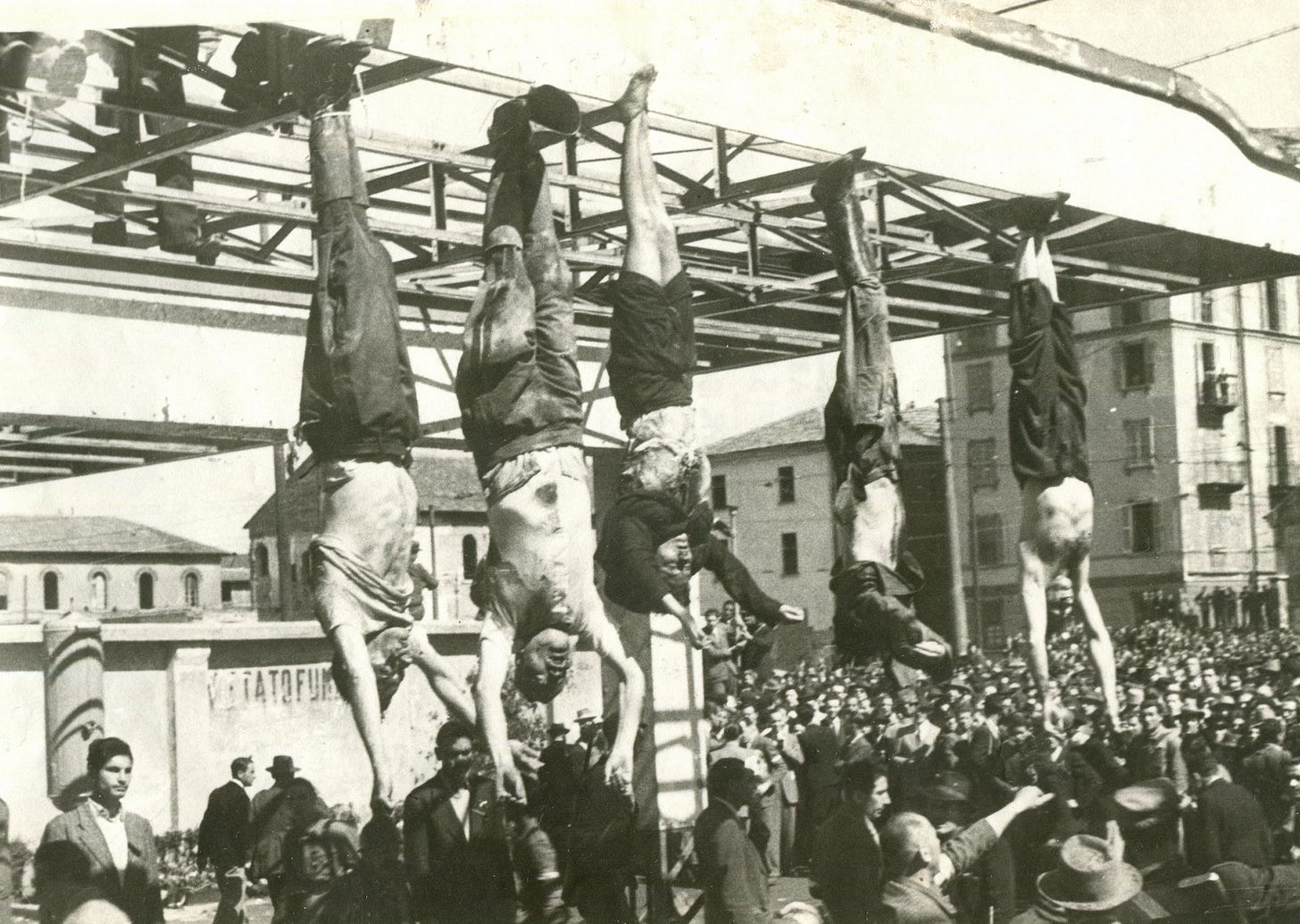
The Political is Personal
All of this hits strangely close to home for me.
Just two nights ago, my husband Andrew and I met some friends for dinner near Piazzale Loreto. We stopped beforehand at the large monument erected in honor of the antifascists who’d been executed there.
There’s no monument to Mussolini in Piazzale Loreto. The Esso station from which his body was suspended has long since disappeared.
History is often written about big, dramatic, world-changing events, it is true. But it’s also often very local and very personal. My brother-in-law reminded me this afternoon that today isn’t just Liberation Day. It also would have been the 72nd wedding anniversary of my late parents-in-law, who survived the Nazi occupation of Poland before eventually fleeing communism by moving to the U.K. and then the U.S.
As I move about my adopted hometown of Milan, I remember that the Nazi tanks rolled through these streets, and the fascists marched in these squares. The trains packed with Jews left from these stations and rolled along these tracks as they headed for Auschwitz. The Allied planes bombed these neighborhoods as they attempted to wrest Italy from the iron grips of Hitler and Mussolini.
Andrew and I are spending this long weekend up at our little lake apartment, and I am conscious of the fact that it was along the shore of this lake that Mussolini fled, as he headed for those snowcapped mountains as he tried to make it across the Swiss border. And it was these same church bells that rang in celebration when he failed.
How We Celebrated Today
One of the ways I’ve been educating myself about modern Italian history is through re-listening to a podcast called “Pack One Bag.” This award-winning, 10-episode series tells the epic true story of an Italian family split apart by love, fascism, and war. It’s utterly gripping and a real work of art. (I’m going to publish a full post about the show soon!)
Early this morning, I sipped my coffee on the back balcony and listened again to the episode entitled “A Thousand Hopes.” Tears fell from my eyes as it recounted the end of the long occupation and the first morning of freedom after the liberation of Rome.
Andrew and I decided to take advantage of the spectacular spring weather by doing one of our favorite loop hikes. We headed south along the lake, crossed a large meadow, and then briefly proceeded down a country road before turning off onto a trail. We climbed through the woods as we crossed babbling brooks surrounded by lush ferns and verdant moss.
While we walked, I asked Andrew questions about the Second World War, which is something I don’t believe I ever formally studied in school,2 and he told me about the War’s many twists and turns. I listened as he recounted the incredible hubris of Hitler and Imperial Japan, and how this led to miscalculations on both of their parts that dramatically changed the trajectory of the War. I was grateful for their foolishness.
We reached a stone outcropping and looked a few kilometers across the lake at Dongo, the village where Mussolini was apprehended the day before his death.3 For some reason, I wondered what the weather had been like as Il Duce lived his final moments of freedom.
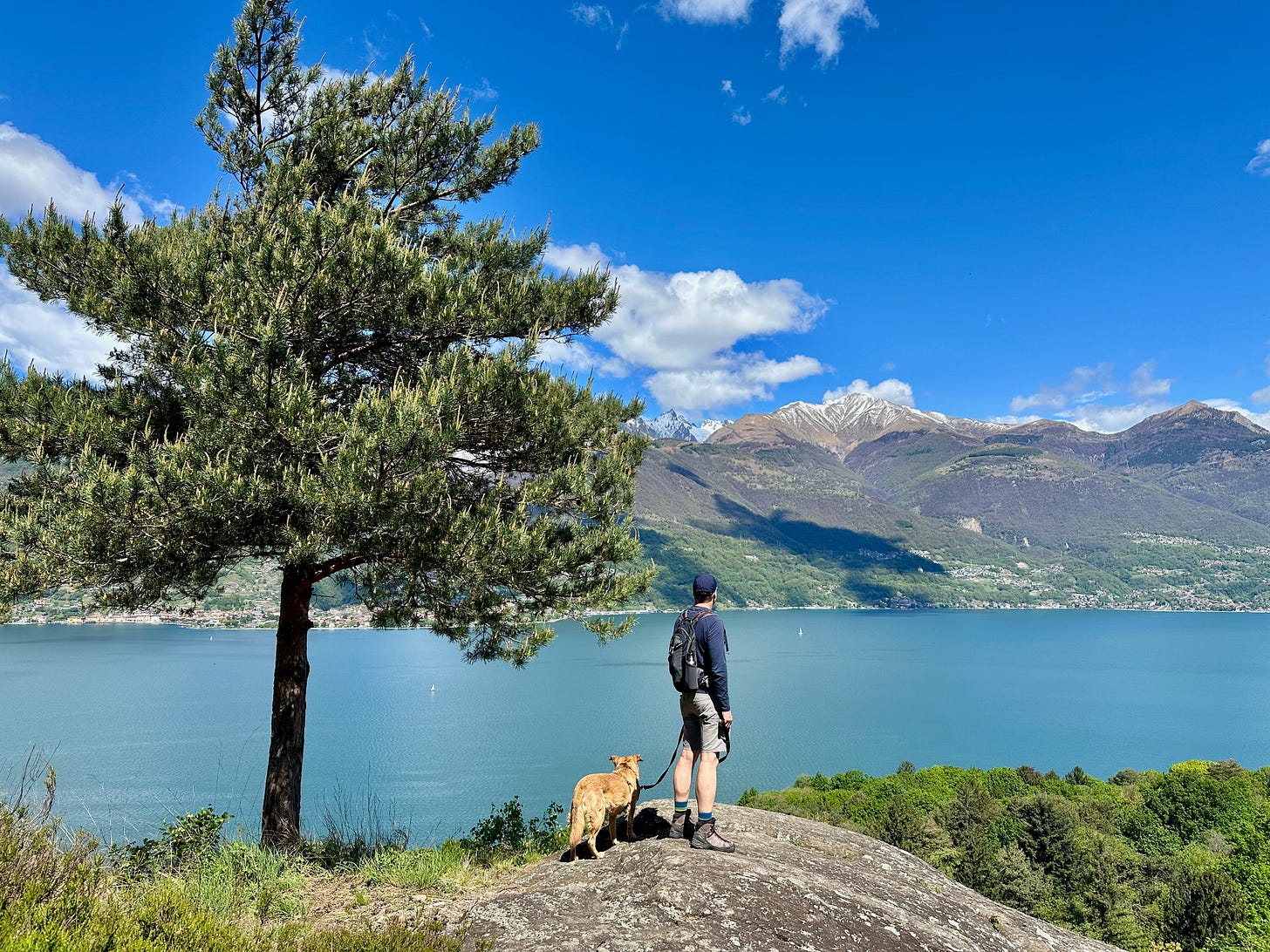
Walking amidst the cheerful singing of birds, we descended toward Piona Bay, where we found people sunning themselves. Two men were standing in a small fishing boat, casting their lines. A father and his young daughter were tossing a stick a little way into the water as they tried to teach their puppy to fetch. A few hardy souls waded tentatively into the chilly waters before deciding it wasn’t yet swimmable.
As we turned onto the country road and headed back toward town, we saw two cows chewing their cud, goats grazing nearby. I noticed the inhabitants of the therapy donkey farm were getting a spring visit from the farrier.
The breeze picked up as we got closer to the lake, and thousands of buttercups and other wildflowers waved erratically in the fields. The sound of music came from the soccer fields, where shirtless teenaged boys were kicking around a pallone da calcio. As we passed the local tennis club, I heard the rhythmic whack whack whack of balls being returned back and forth over the nets. The hum of lawn mowers, weed wackers, and leaf blowers drifted on the air. I noticed a kite surfer unpacking his wetsuit and gear. The ferry was docked while the employees enjoyed their lunch hour before heading back down to Como.
As we approached our favorite gelato shop, just two doors down from our apartment, I wondered if 1:30 was too early for a cone. Plenty of people had obviously decided not; they sat basking in the sunshine on the waterfront benches, taking in the sweeping views while enjoying their treats.
The horrors of the 1940s felt both very close and very far away.
For much of my education, I attended a tiny Baptist school that was surrounded by a cow pasture. The way I remember things all these years later, we spent so much time studying the origins of the United States and the idea of Manifest Destiny that by the end of the academic year we’d simply run out of time to get into the historical events of the 20th century.
We hiked through Dongo just a few weeks ago, on Andrew’s birthday. At the time, I wasn’t yet aware of the town’s historical significance.


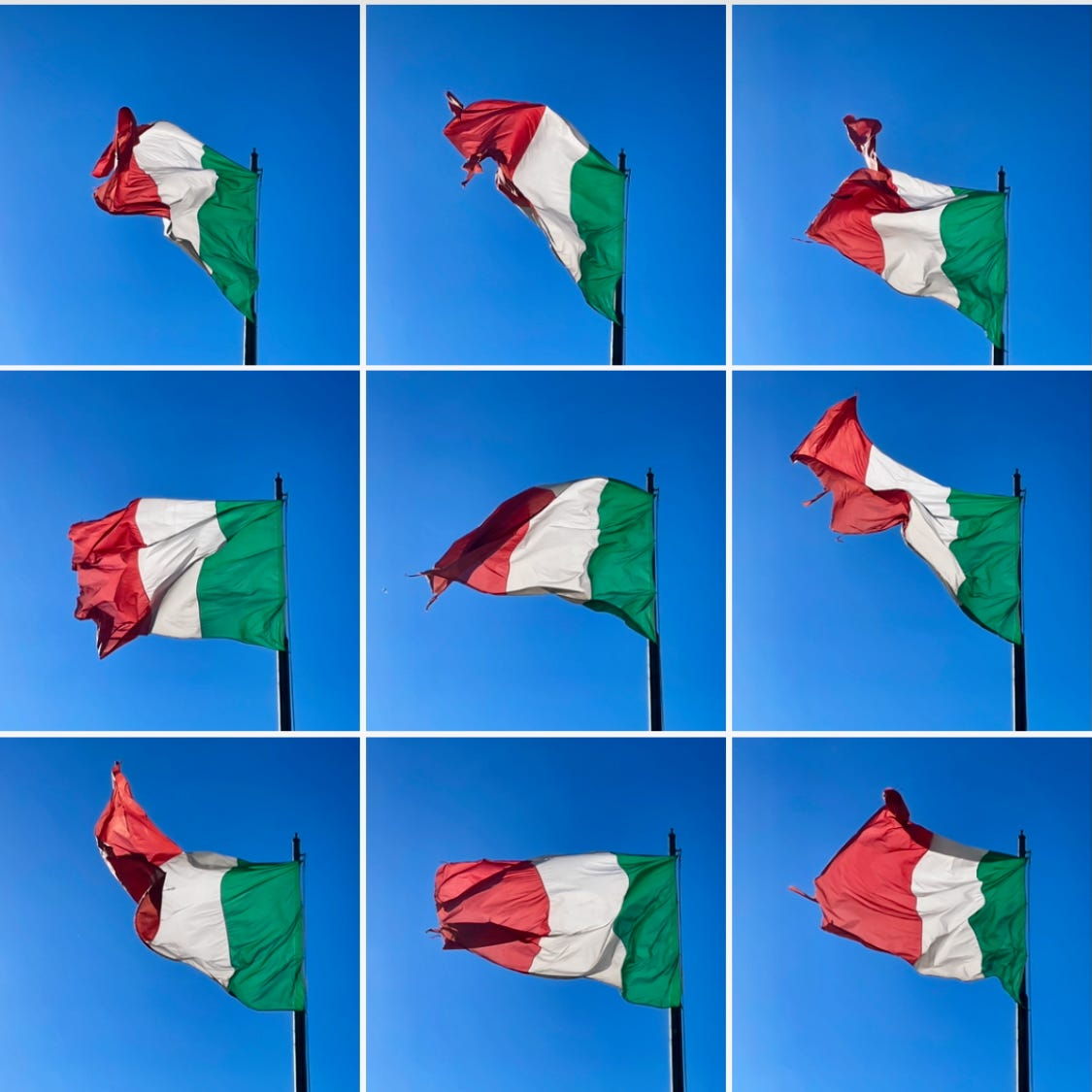
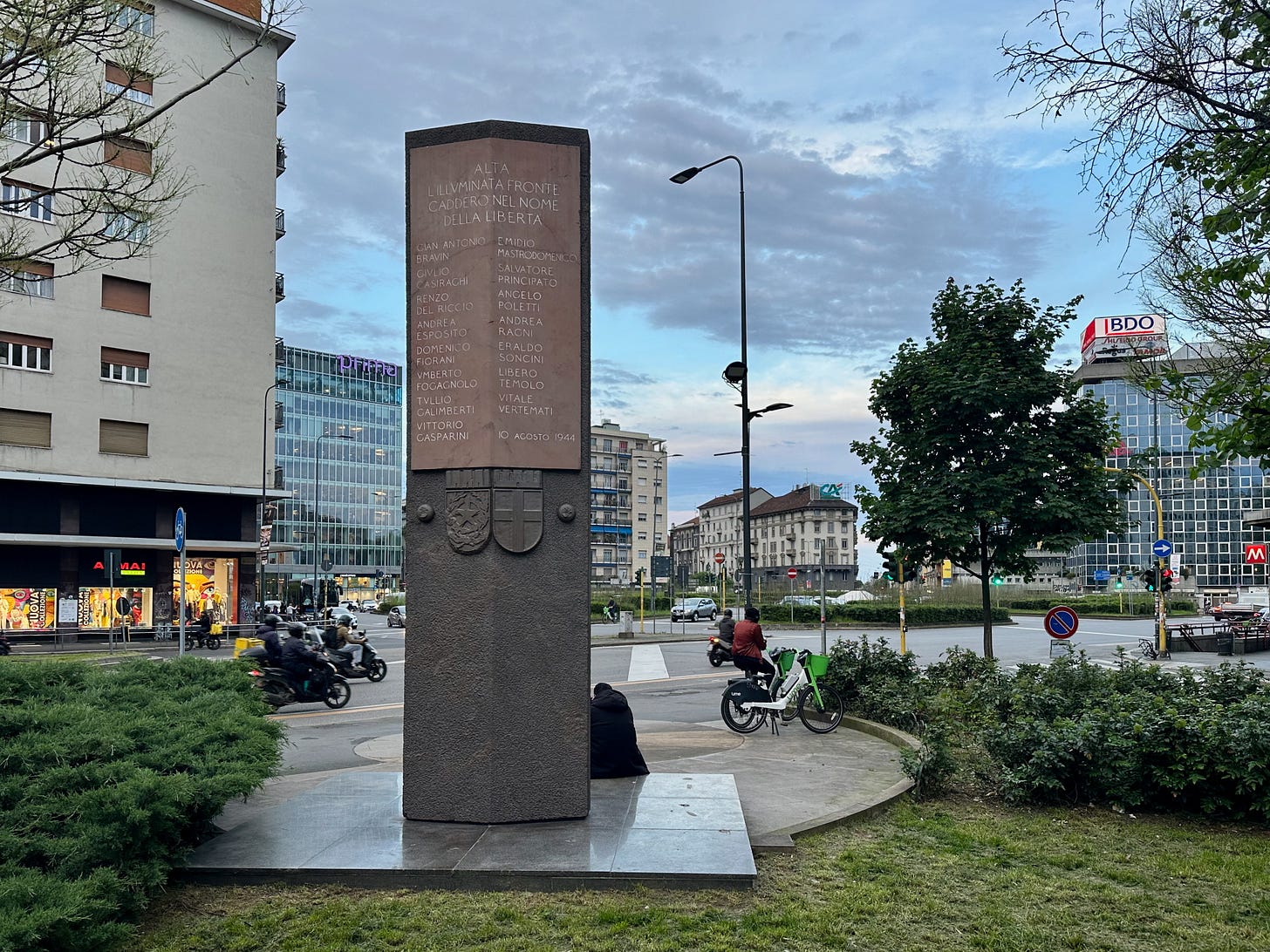
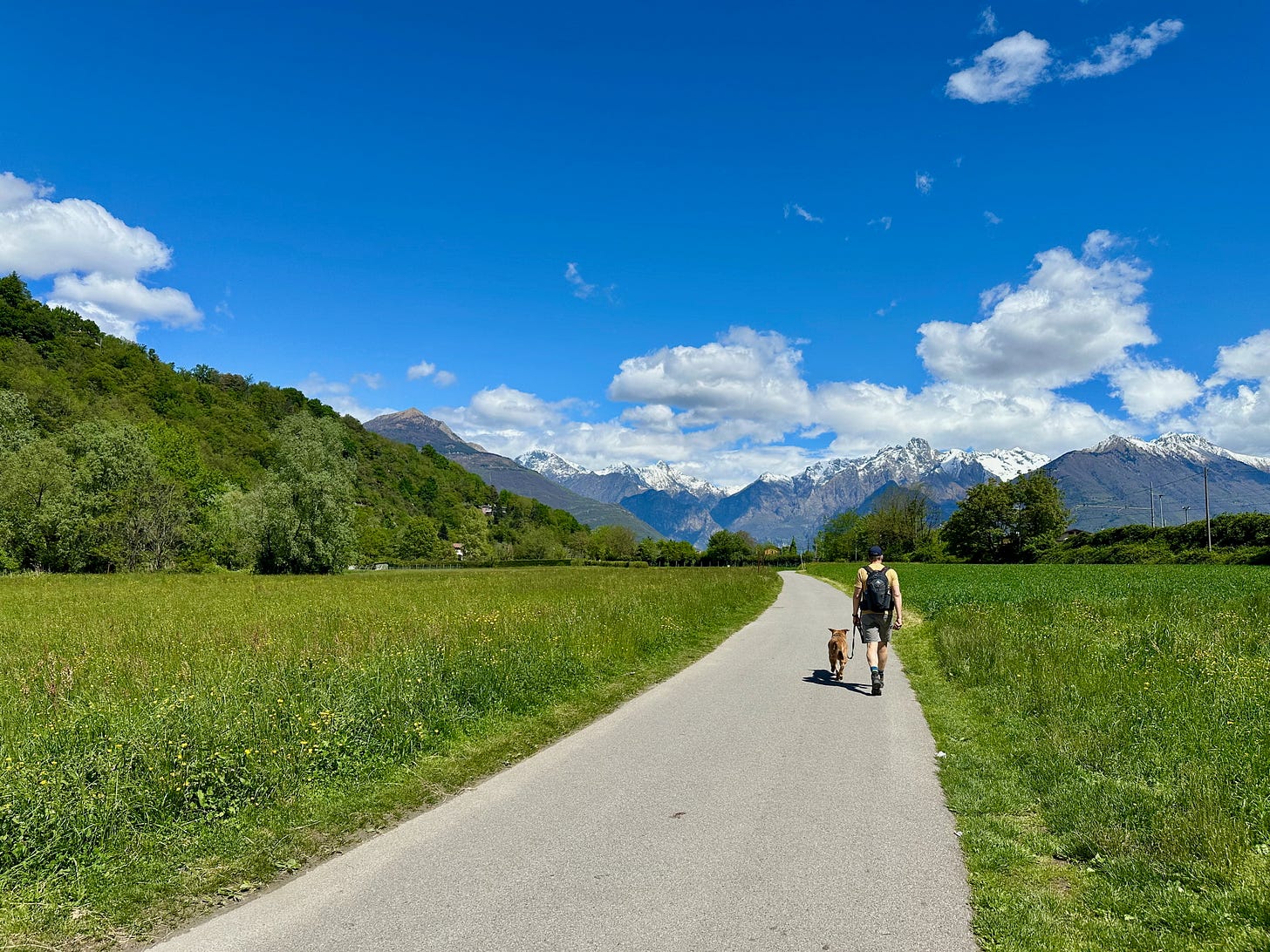
Great summary of the Liberation D.
I asked my grandmother at least ten times to tell me how she was liberated during the war. To make WWII more personal to me. She is a 107 and is still grateful for the allies.